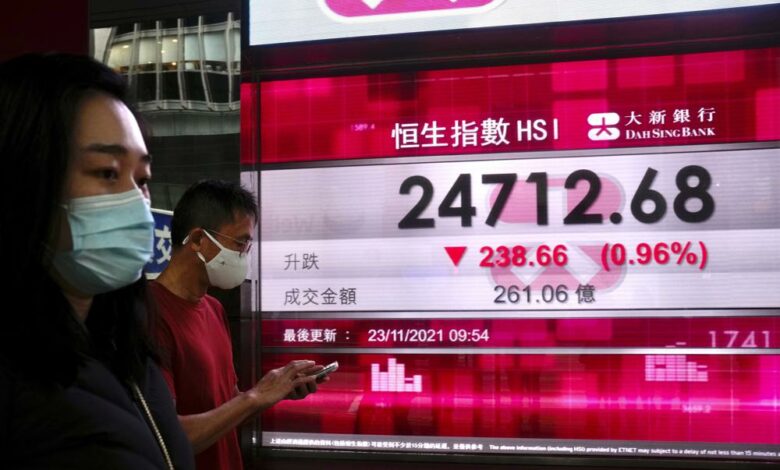
Shares opened lower in Europe on Tuesday after a mixed session in Asia, as countries imposed lockdowns and other restrictions to fight flare-ups of coronavirus cases.
Benchmarks dropped in London, Paris, Hong Kong and South Korea. The Shanghai composite index edged higher, while Tokyo was closed for a holiday. U.S. futures were lower.
On Monday, the S&P 500 lost 0.3 percent, the Nasdaq fell 1.3 percent and the Dow Jones Industrial Average eked out a tiny gain after President Joe Biden said he would ask Jerome Powell to serve a second four-year term at the helm of the Federal Reserve, a vote of confidence in Powell’s handling of central bank policies during the brutal disruptions caused by the coronavirus pandemic.
Yet another resurgence of new coronavirus infections in Europe, the U.S. and Asia have prompted another round of restrictions to try to quash outbreaks.
In Europe, authorities have urged calm as protests broke out protesting tough COVID-19 measures as infections spike upward again. The continent is now the global epicenter of the pandemic as cases soar to record levels in many countries.
Spiking infections and measures to rein them in are combining to usher in a second straight grim holiday season in Europe.
Germany’s DAX sank 1.4 percent in early trading Tuesday to 15,889.88 and the CAC 40 in Paris shed 1.3 percent to 7,011.34. Britain’s FTSE slipped 0.7 percent to 7,207.51.
The futures for the S&P 500 and the Dow industrials were down 0.4 percent.
Outbreaks in some Asian countries including China and South Korea have also slowed progress toward ending the pandemic.
In Asian trading, Hong Kong’s Hang Seng fell 1.2 percent to 24,651.58 and the Kospi in Seoul lost 0.5 percent to 2,997.33. In Sydney, the S&P/ASX 200 climbed 0.8 percent to 7,410.60 and the Shanghai Composite index added 0.2 percent to 3,588.77.
Shares rose in India but fell in Taiwan.
Investors have been watching to see if pressure from rising inflation will goad the Fed into speeding up its plans for trimming bond purchases and raising its benchmark interest rate.
The U.S. central bank has begun trimming bond purchases that have helped keep interest rates low to support the economy and markets.
In other trading Tuesday, U.S. benchmark crude oil lost 86 cents to $75.89 per barrel in electronic trading on the New York Mercantile Exchange.
Brent crude, the standard for international pricing, gave up 60 cents to $79.10 per barrel.
The U.S. dollar fell to 114.63 Japanese yen from 114.88 yen late Monday. The euro edged up to $1.1265 from $1.1237.
Traders are awaiting word on whether Biden might order a release from the U.S. strategic oil reserve, possibly in coordination with other major consuming nations such as Japan, South Korea and India.
Such a “move by the United States could push OPEC+ into a corner and force it to rethink its future production plans or risk losing a share of the market,” Naeem Aslam of Avatrade said in a report.
So far, officials in Japan and the U.S. have said no decision has been made on such a move, meant to counter surging prices for crude oil as growth in demand outstrips increases in output.
Trading is growing quieter ahead of the Thanksgiving holiday on Thursday, when U.S. markets will be closed. They will also close early on Friday.




